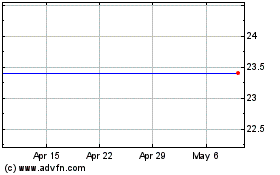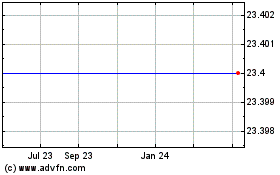WASHINGTON—Drugmakers Valeant Pharmaceuticals International Inc.
and Turing Pharmaceuticals AG boosted the prices of newly acquired
drugs to meet preset profit targets, congressional investigators
wrote in memos that summarized internal company documents they
obtained.
The price hikes by Valeant and Turing spurred public outrage and
prompted congressional investigations.
Executives from both companies are expected to testify Thursday
at a hearing of the House Oversight and Government Reform
Committee. Democrats on the panel released the memos Tuesday.
A number of pharmaceutical companies have raised the prices of
drugs after acquiring the rights to sell them in the U.S., a tactic
that some Wall Street analysts say is contributing to higher
spending on prescription medicines and has prompted criticism of
price gouging.
From 2014 to 2015, Valeant raised the price of more than 20
prescription products by more than 200%, the Democrats' memos say.
The company increased the prices of several of these products in
some cases by as much as 800%, according to the memos.
In February 2015, Canada-based Valeant purchased two
long-standing drugs that treat heart problems—Isuprel and
Nitropress—from privately held Marathon Pharmaceuticals LLC.
Valeant then raised their prices by 525% and 212% respectively
overnight. The list price for a one-milliliter vial of Isuprel,
which treats abnormal heart rhythms, jumped to $1,246.62, up from
$215.46.
After the prices were raised, Valeant saw gross revenues of more
than $547 million and profits of about $351 million in 2015,
according to the memos.
Howard Schiller, Valeant's former chief financial officer who is
now the company's interim CEO, wrote in a May 2015 email that 80%
of Valeant's revenue growth was from price increases on its drugs
in the first quarter.
Excluding the drug rights obtained through Marathon, price
represented about 60% of the company's growth, according to Mr.
Schiller's email.
Valeant said in a statement Tuesday that outside consultants the
company had hired determined that the prices of Nitropress and
Isuprel didn't reflect their true value to hospitals and
patients.
"In this case, we've heard from hospitals, as well as from
Congress, that we set the price for these two drugs too high, and
we've responded by offering volume-based discounts of up to 30% for
each of them," according to the statement.
Going forward, the company said it expects growth to be driven
more by volume than by price. Moreover, it said it is making
changes such as joining with Walgreens to offer price reductions of
up to 95% for some branded drugs for which there is a generic
alternative. And Valeant said it expects to invest millions in
research and development this year and $1 billion in patient
assistance programs.
A Valeant presentation of a new patient-assistance program noted
that one goal was to "minimize media coverage of the pricing
increase," according to the memos. The presentation included a
draft communications plan that suggested tying the price hikes to
the cost of research and development.
The materials collected by the 43-member committee "confirm what
Americans across the country have experienced firsthand for
years—that many drug companies are lining their pockets at the
expense of some of the most vulnerable families in our nation,"
said Rep. Elijah Cummings of Maryland, the top Democrat on the
committee, who released the memo.
On Nov. 3, the panel's Democrats announced the creation of a
drug-pricing task force to explore the root causes of the increases
and how to limit them. Democrats on the panel have focused on the
companies' price increases, while Republicans have examined the
Food and Drug Administration's approval process, which GOP members
say needs streamlining. The panel's chairman, Rep. Jason Chaffetz
(R., Utah) has disputed Democrats' claims that he hasn't tackled
the issue and agreed to the hearings.
Like Valeant, Turing raised the price of a drug it had acquired.
In 2015, the company purchased Daraprim, which is used to treat a
parasite infection. Turing increased the price by 500%, from $13.50
to $750 for a tablet. Former pharmaceutical executive Martin
Shkreli, who has been subpoenaed to testify at the hearing, became
the target of public ire after the price increase.
In a statement Tuesday, Turing said revenue from the Daraprim
cost increase funds research, development, and patient-access
programs.
"We are committed to ensuring that no patient will ever be
denied access to Daraprim because of cost, and to investing net
profits in groundbreaking research," the statement said.
Mr. Shkreli purchased the drug for the purposes of increasing
its price and sought to manage the negative publicity from
advocates in the AIDS and HIV community, according to the memos.
Mr. Shkreli didn't decrease the price of the drug as promised.
Turing focused on how to tamp down the public backlash. "We
still come out ahead if we can frame this issue within the HIV/AIDS
community as a fight between a drug company and insurance
companies," an outside consultant wrote on Sept. 21, 2015.
Mr. Shkreli stepped down as Turing CEO in December after he was
arrested for allegedly misleading investors in his hedge funds and
raiding another public company to cover the losses. Mr. Shkreli
pleaded not guilty and has denied all charges.
His lawyers have asked the committee to grant him a limited
immunity so he could testify at the hearing but his testimony
couldn't be used in the prosecution against him.
Write to Stephanie Armour at stephanie.armour@wsj.com and
Jonathan D. Rockoff at Jonathan.Rockoff@wsj.com
(END) Dow Jones Newswires
February 02, 2016 16:05 ET (21:05 GMT)
Copyright (c) 2016 Dow Jones & Company, Inc.
Valeant Pharma (NYSE:VRX)
Historical Stock Chart
From Mar 2024 to Apr 2024

Valeant Pharma (NYSE:VRX)
Historical Stock Chart
From Apr 2023 to Apr 2024
